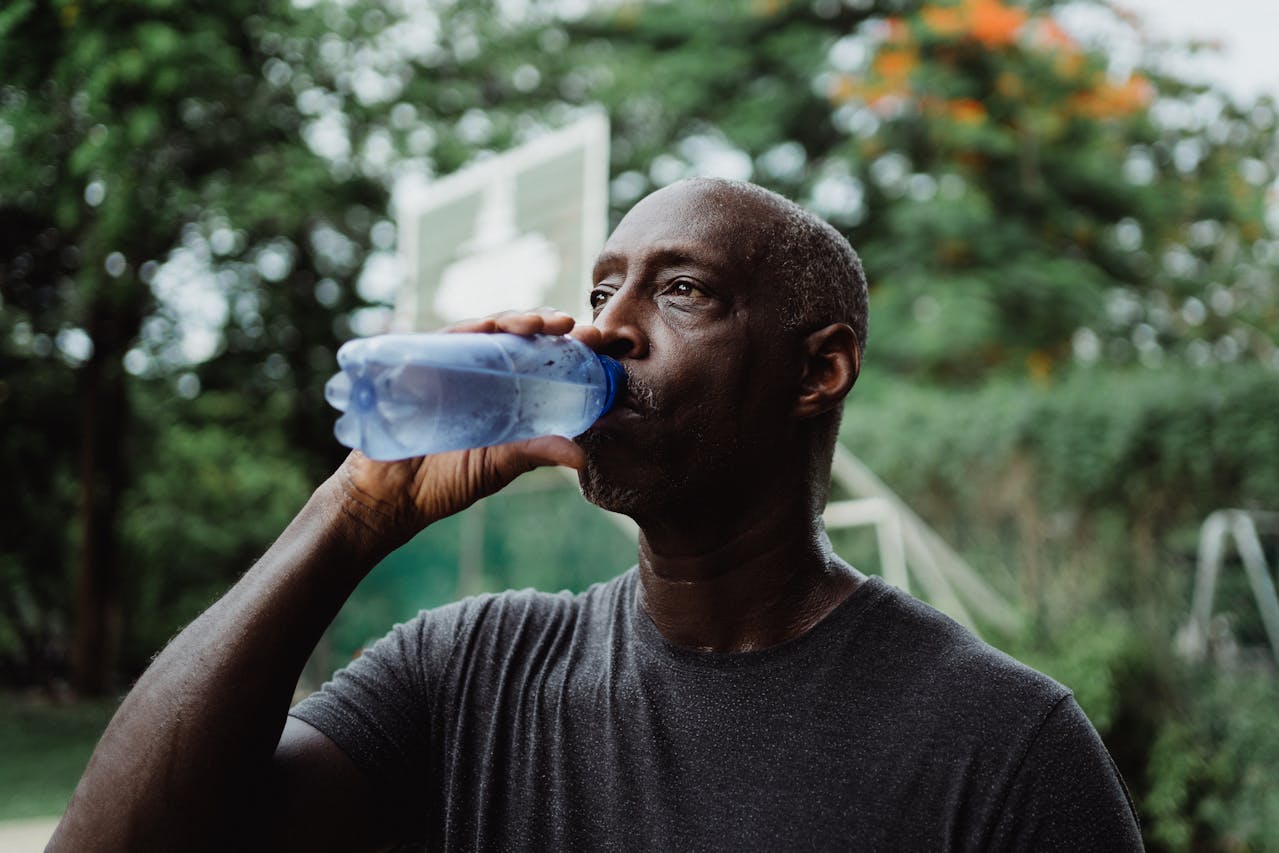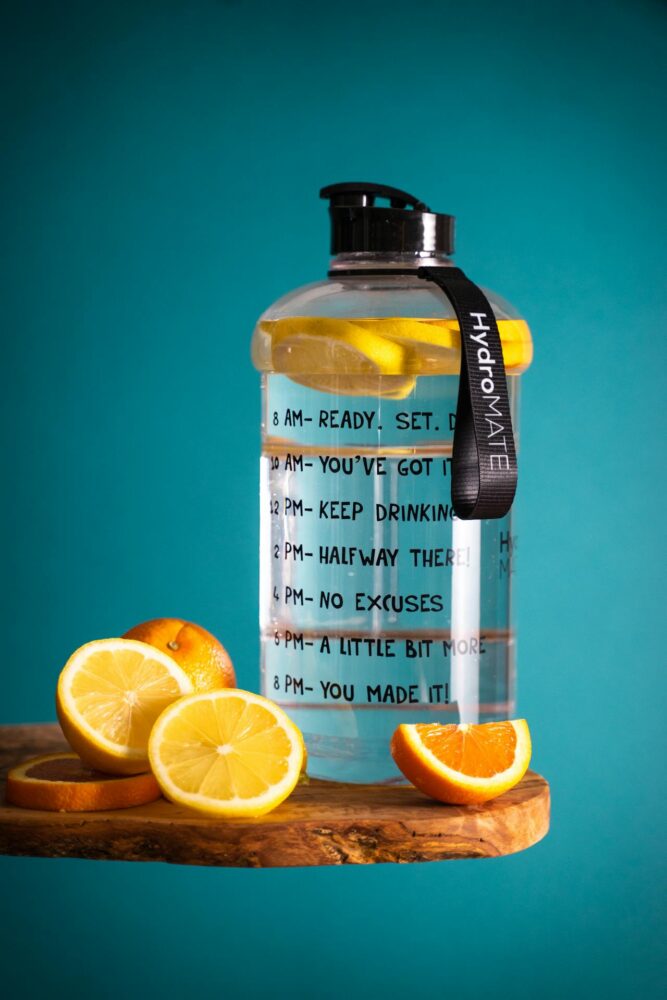Water and Heart Health

Did you know that the key to a healthy heart might be as close as your kitchen sink?
Water is the unsung hero of our bodies. We often hear about eating right and exercising for good health, but drinking enough water is just as crucial. When it comes to keeping our hearts beating smoothly, water plays a starring role.
Our hearts work non-stop to keep us alive. Like any hard-working machine, it needs the right fuel to run well. That fuel isn’t just the food we eat, it’s also the water we drink.
This article will explore why water is so important for your heart. We’ll look at how it helps your heart do its job, what can go wrong when you don’t drink enough, and how much you really need each day.
Whether you’re a fitness enthusiast or just someone who wants to take better care of yourself, understanding the link between water and heart health is essential. So pour yourself a glass of water, and let’s go into how this simple act can make a big difference for your heart.
Hydration and Heart Function
Water is vital for your heart’s daily operations. When you’re well-hydrated, your blood becomes thinner and flows more easily through your blood vessels. This means your heart doesn’t have to work as hard to pump blood around your body.
Good hydration also helps maintain a healthy blood volume. This is crucial because it affects your heart rate and blood pressure. When you drink enough water, your heart can maintain a steady, efficient rhythm without overexerting itself.
Moreover, proper hydration supports the electrical signals that keep your heart beating regularly. These signals rely on a delicate balance of electrolytes, which water helps distribute throughout your body.
Dehydration Risks for Heart Health
Not drinking enough water can pose serious risks to your heart. When you’re dehydrated, your blood volume decreases, becoming thicker and harder to pump. This puts extra strain on your heart, potentially leading to increased heart rate and higher blood pressure.
Dehydration also raises the risk of blood clots. Thicker blood is more likely to clump together, potentially forming clots that can block blood flow to the heart or brain, leading to heart attacks or strokes.
Long-term dehydration can contribute to other cardiovascular issues too. It may lead to hardening of the arteries, increasing the risk of heart disease over time. In extreme cases, severe dehydration can even cause heart palpitations or irregular heartbeats.
Research has shown that staying well-hydrated can lower the risk of heart failure. A study published in the European Heart Journal found that people who maintained good hydration levels throughout their lives were less likely to develop heart failure later in life.
Water Quality and Heart Health
Not all water is created equal when it comes to heart health. The quality of your drinking water can have a significant impact on your cardiovascular system.
Hard water, rich in minerals like calcium and magnesium, might actually benefit heart health. Some studies suggest areas with hard water have lower rates of heart disease. On the flip side, soft water lacks these minerals and may not offer the same benefits.
But water quality isn’t just about hardness. Contaminants can pose serious risks. Lead, for instance, can raise blood pressure and damage heart tissue over time. Other pollutants like arsenic and certain chemicals have also been linked to heart problems.
Optimal Water Intake for Heart Health
So how much water should you drink for a healthy heart? The old advice of “8 glasses a day” isn’t one-size-fits-all. Your needs depend on various factors like your age, gender, activity level, and climate.
A good rule of thumb is to drink enough so that you rarely feel thirsty and your urine is pale yellow. For most adults, this translates to about 2-3 litres (or 8-12 cups) of water per day.
But it’s not just about quantity. Timing matters too. Spreading your water intake throughout the day is better for your heart than gulping large amounts at once. This steady hydration helps maintain consistent blood volume and reduces strain on your heart.
Don’t forget that your water needs increase in hot weather, during exercise, or if you’re ill. Pregnant women and breastfeeding mothers also need more water.
Alternatives to Plain Water
While plain water is the best choice for hydration, it’s not the only option. Many foods and drinks can contribute to your daily fluid intake and heart health.
- Fruits and vegetables with high water content are excellent choices. Watermelon, cucumbers, strawberries, and lettuce are all over 90% water. They not only hydrate you but also provide essential vitamins and minerals that support heart health.
- Unsweetened herbal teas can be a flavourful way to increase your fluid intake. Some, like hibiscus tea, may even help lower blood pressure. Green tea, rich in antioxidants, has been linked to improved heart health.
- Low-fat milk and plant-based milk alternatives can hydrate while providing calcium and vitamin D, nutrients important for heart health. Just be mindful of added sugars in flavoured varieties.
- Sports drinks can be useful during intense exercise lasting over an hour, but for most people, they’re unnecessary and can add extra calories and sugar to your diet.
- Coffee and tea, despite their caffeine content, can contribute to your daily fluid intake. However, they’re best consumed in moderation, as excessive caffeine can impact heart rhythms in some people.
Note that sugary drinks like soda should be limited. They can lead to weight gain and increase your risk of heart disease. If you’re looking for flavour, try infusing your water with fresh fruits or herbs instead.
Signs of Dehydration
Recognizing dehydration early is crucial for heart health. Your body sends several signals when it needs more fluids:
1. Thirst is an obvious sign, but by the time you feel thirsty, you’re already mildly dehydrated.
2. Dark urine is another clear indicator – your urine should be pale yellow, like lemonade. If it’s darker, like apple juice, you need to drink more water.
3. Dry mouth, lips, and eyes are common symptoms. You might also notice your skin feels less elastic. Try this popular trick: pinch the skin on the back of your hand. If it doesn’t snap back quickly, you could be dehydrated.
4. Fatigue, dizziness, and headaches can all result from not drinking enough. These symptoms occur because your blood volume drops, making your heart work harder to pump blood to your brain and organs.
5. In more severe cases, you might experience rapid heartbeat or breathing, confusion, or fainting. These are serious signs that require immediate attention.
6. For heart health, pay special attention to symptoms like heart palpitations or chest discomfort, which can sometimes be linked to dehydration.
7. Older adults need to be extra vigilant, as the sensation of thirst diminishes with age, making them more prone to dehydration.
Tips for Staying Hydrated
Maintaining good hydration doesn’t have to be a chore. Here are
10 practical strategies to help you drink more water:
1. Start your day with a glass of water. Your body loses water overnight, so rehydrating first thing can jumpstart your metabolism and support heart function.
2. Keep a reusable water bottle with you. Having water readily available makes you more likely to sip throughout the day. Choose a bottle you enjoy using – it can be a fun way to express your style while staying healthy.
3. Set reminders on your phone or computer. In our busy lives, it’s easy to forget to drink water. Regular prompts can help you develop a consistent habit.
4. Eat your water. Incorporate more fruits and vegetables with high water content into your diet. They’ll contribute to your fluid intake while providing valuable nutrients.
5. Flavour your water naturally. If you find plain water boring, try adding slices of lemon, cucumber, or berries. Herbs like mint can also add a refreshing twist.

6. Create a routine. Link drinking water to regular activities. For example, have a glass of water before each meal, or every time you take a break at work.
7. Use a smart water bottle or app. These can track your intake and remind you to drink. Some even sync with fitness trackers to adjust your hydration goals based on your activity level.
8. Consider your environment. If you’re in a hot climate or at high altitude, you’ll need to drink more. The same goes for when you’re sick or exercising.
9. Make it a social activity. Challenge friends or family members to a hydration contest. It can be a fun way to encourage each other to drink more water.
10. Listen to your body. While guidelines are helpful, your body’s needs can vary. Pay attention to signs of thirst and adjust your intake accordingly.
Remember, staying hydrated is one of the simplest yet most effective ways to support your heart health. By making it a priority, you’re taking a significant step towards a healthier life.
Conclusion
Water is more than just a refreshing drink. It’s a vital player in keeping your heart healthy and strong. From thinning your blood to regulating your heart rate, water’s impact on heart health is far-reaching and profound.
Let’s recap the key points:
- Proper hydration eases your heart’s workload, helping it pump blood more efficiently.
- Dehydration can lead to serious heart issues, including increased risk of blood clots and heart disease.
- The quality of your water matters. Contaminants can harm your heart, while certain minerals may offer benefits.
- Your optimal water intake depends on various factors, but aim for pale yellow urine as a good indicator.
- Beyond plain water, many foods and drinks can contribute to your hydration and heart health.
- Recognizing the signs of dehydration early can help you avoid potential heart problems.
- Simple strategies, like carrying a water bottle or setting reminders, can help you stay hydrated throughout the day.
But as we wrap up, it’s crucial to remember that not everyone has easy access to clean, safe water. At AquaMaya we are working tirelessly to change this reality. Our efforts are not just about quenching thirst, our efforts are about saving lives and promoting long-term health, including heart health.
AquaMaya’s mission to bring sustainable water solutions to communities in need highlights a global truth: water is at the heart of health. By providing access to clean water, we are not only reducing waterborne diseases but also laying the foundation for better cardiovascular health in these communities.
Our work serves as a reminder that every glass of clean water we drink is a privilege – one that millions around the world still lack. It’s also a reminder of how fundamental water is to our well-being, especially our heart health.
By staying hydrated, you’re doing your heart a favour. And by supporting organisations like AquaMaya, you can help extend that same life-giving benefit to others.
Remember, a healthy heart starts with a glass of clean water. It’s a simple act with profound implications for you, and potentially, for someone halfway across the world.
Sources:
1. https://theheartfoundation.org/2019/03/08/the-importance-of-water/.
3. https://www.webmd.com/dvt/ss/slideshow-dvt-improve-circulation
4. https://www.healthline.com/health/dehydration-and-blood-pressure
5. https://www.hri.org.au/health/your-health/lifestyle/hydration-and-your-heart
6. https://www.mayoclinic.org/healthy-lifestyle/nutrition-and-healthy-eating/in-depth/water/
7. https://www.healthline.com/nutrition/19-hydrating-foods






